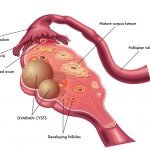Tongkat Ali: A Potent Herb from the Rainforest
Ronald Steriti, ND, PhD
Long Jack or Tongkat Ali (Eurycoma longifolia Jack) is a Malaysian herb that is considered a powerful male aphrodisiac, tonic, and energy enhancer. Tongkat Ali has an intensely bitter taste and has traditionally been used to treat fevers and malaria. Tongkat Ali translates into “Ali’s Cane,” which refers to its aphrodisiac properties.
Tongkat Ali grows wild in the rainforests of the Southeast Asia. The roots of the Tongkat Ali tree grow as much as one meter straight into the ground, unlike most trees, which have a horizontal root system. Tongkat Ali roots take at least five years to mature, and older trees (15-20 years) have roots that are taller than most people.
Tongkat Ali is a heating stimulant and when taken in large doses can cause side effects of insomnia, restlessness, and irritability.
The exact mechanism of action of Tongkat Ali is not known. Studies indicate that the root contains several compounds including beta-carboline alkaloids and quassinoid-type glycosides, including eurycomaoside (Low et al., 2005; Bedir et al., 2003; Ang et al., 2002).
Scientific Studies
H.H. Ang at the School of Pharmaceutical Sciences, University Science Malaysia, showed in several studies that Eurycoma longifolia Jack increases libido, virility, and sexual prowess in male rats (Ang et al., 2003; Ang and Lee, 2002a, 2002b, Ang et al., 2001; Ang and Cheang, 2001; Ang et al., 2000; Ang and Sim, 1998a, 1998b).
Extract of Eurycoma longifolia Jack has been shown to have significant cytotoxic effect on several cancer cell lines, including breast and lung (Nurhanan et al., 2005; Tee and Azimahtol, 2005; Kuo et al., 2004; Kuo et al., 2003; Jiwajinda et al., 2002; Kardono et al., 1991).
Several studies showed significant antiplasmodial activity of the quassinoids, especially eurycomanone, which confirmed Tongkat Ali’s traditional use against malaria (Kuo et al., 2004; Jiwajinda et al., 2002; Kardono et al., 1991; Hout et al., 2006; Chan et al., 2005; Chan et al., 2004; Ang et al., 1995).
High doses were shown to have antihyperglycemic activity in rats (Husen, 2004).
One study showed anxiolytic activity in mice (Ang and Chean, 1999).
References
Ang HH, Cheang HS: Studies on the anxiolytic activity of Eurycoma longifolia Jack roots in mice, Jpn J Pharmacol 79(4):497-500, 1999.
Ang HH, Cheang HS: Effects of Eurycoma longifolia jack on laevator ani muscle in both uncastrated and testosterone-stimulated castrated intact male rats, Arch Pharm Res 24(5): 437-40, 2001.
Ang HH, Lee KL: Effect of Eurycoma longifolia Jack on libido in middle-aged male rats, J Basic Clin Physiol Pharmacol 13(3):249-54, 2002a.
Ang HH, Lee KL: Effect of Eurycoma longifolia Jack on orientation activities in middle-aged male rats, Fundam Clin Pharmacol 16(6):479-83, 2002b.
Ang HH, Sim MK: Eurycoma longifolia increases sexual motivation in sexually naive male rats, Arch Pharm Res 21(6):779-81, 1998a.
Ang HH, Sim MK: Eurycoma longifolia Jack and orientation activities in sexually experienced male rats, Biol Pharm Bull 21(2):153-5, 1998b.
Ang HH et al: In vitro antimalarial activity of quassinoids from Eurycoma longifolia against Malaysian chloroquine-resistant Plasmodium falciparum isolates, Planta Med 61(2):177-8, 1995.
Ang HH et al: Effects of Eurycoma longifolia Jack (Tongkat Ali) on the initiation of sexual performance of inexperienced castrated male rats, Exp Anim 49(1):35-8, 2000.
Ang HH et al: Evaluation of the potency activity of aphrodisiac in Eurycoma longifolia Jack, Phytother Res 15(5):435-6, 2001.
Ang HH et al: Quassinoids from Eurycoma longifolia, Phytochemistry 59(8):833-7, 2002.
Ang HH et al: Effects of Eurycoma longifolia Jack on sexual qualities in middle aged male rats, Phytomedicine 10(6-7):590-3, 2003.
Bedir E et al: Eurycomaoside: a new quassinoid-type glycoside from the roots of Eurycoma longifolia, Chem Pharm Bull (Tokyo) 51(11):1301-3, 2003.
Chan KL et al: Antiplasmodial studies of Eurycoma longifolia Jack using the lactate dehydrogenase assay of Plasmodium falciparum, J Ethnopharmacol 92(2-3):223-7, 2004.
Chan KL et al: Semisynthetic 15-O-acyl- and 1,15-di-O-acyleurycomanones from Eurycoma longifolia as potential antimalarials, Planta Med 71(10):967-9, 2005.
Hout S et al: Screening of selected indigenous plants of Cambodia for antiplasmodial activity, J Ethnopharmacol Mar 17, 2006.
Husen R et al: Screening for antihyperglycaemic activity in several local herbs of Malaysia, J Ethnopharmacol 95(2-3):205-8, 2004.
Jiwajinda S et al: In vitro anti-tumor promoting and anti-parasitic activities of the quassinoids from Eurycoma longifolia, a medicinal plant in Southeast Asia, J Ethnopharmacol 82(1):55-8, 2002.
Kardono LB et al: Cytotoxic and antimalarial constituents of the roots of Eurycoma longifolia, J Nat Prod 54(5):1360-7, 1991.
Kuo PC et al: Cytotoxic and antimalarial beta-carboline alkaloids from the roots of Eurycoma longifolia, J Nat Prod 66(10):1324-7, 2003.
Kuo PC et al: Cytotoxic and antimalarial constituents from the roots of Eurycoma longifolia, Bioorg Med Chem 12(3):537-44, 2004.
Low BS et al: Bioavailability and pharmacokinetic studies of eurycomanone from Eurycoma longifolia, Planta Med 71(9):803-7, 2005.
Nurhanan MY et al: Cytotoxic effects of the root extracts of Eurycoma longifolia Jack, Phytother Res 19(11):994-6, 2005.
Tee TT, Azimahtol HL: Induction of apoptosis by Eurycoma longifolia jack extracts, Anticancer Res 25(3B):2205-13, 2005.
 Ronald Steriti, ND, PhD, is a graduate of Southwest College of Naturopathic Medicine and is currently a medical advisor for Lifexpand.com, a U.S. manufacturer and distributor of health and dietary supplements that has tapped into the vast natural resources and unique ecosystem of the Brazilian rainforest.
Ronald Steriti, ND, PhD, is a graduate of Southwest College of Naturopathic Medicine and is currently a medical advisor for Lifexpand.com, a U.S. manufacturer and distributor of health and dietary supplements that has tapped into the vast natural resources and unique ecosystem of the Brazilian rainforest.










